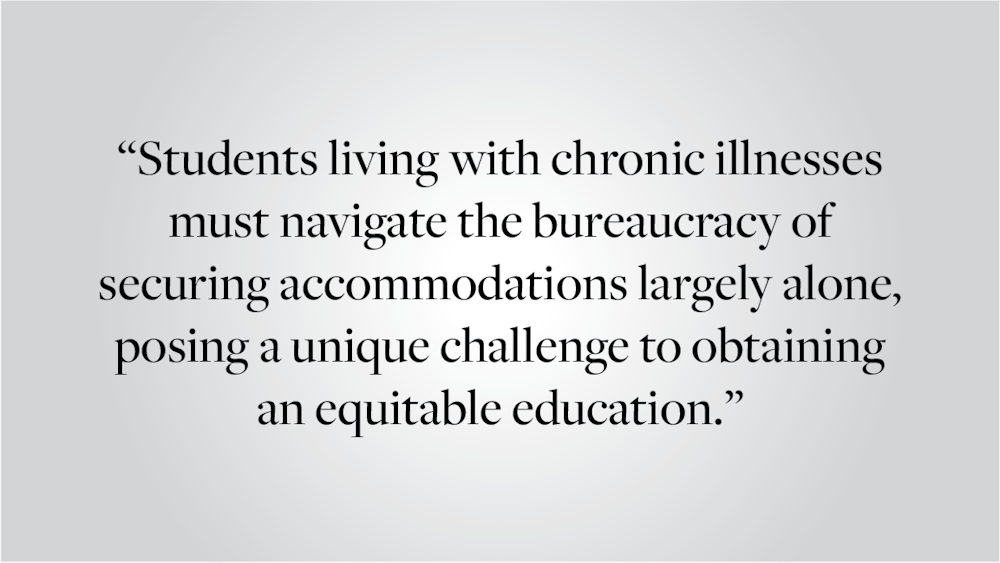Living with chronic illness is no easy task, but living with chronic illness in college sometimes feels impossible.
Last year, I learned that my medications meant to treat my illness were not working. I relapsed. While I am no longer in clinical remission, I am on a new medication that has the potential to alleviate my symptoms and place me back into clinical remission, when my symptoms are minimized so that they don’t interfere substantially with daily life. Time is of the essence, and the way I handle this period is important for my lifelong health. I am still learning how to navigate college life, but it has been a challenge to stay in remission at Brown. The nature of chronic illness is unpredictable, and the discretion often used when granting “reasonable” accommodations does not always factor in the nuances of chronic illness. Furthermore, even with access to resources through Brown Student Accessibility Services, students living with chronic illnesses must navigate the bureaucracy of securing accommodations largely alone, posing a unique challenge to obtaining an equitable education.
The only way for me to stay in school is to take a preventative approach to my illness. I must avoid relapses that could send me back to the Mayo Clinic and interrupt my semester. Early intervention, therefore, is key. Only through acting swiftly can I prevent a disease flare-up from turning into a full-blown relapse. In general, relapses pose a barrier to education for students with chronic illnesses — not only for health reasons but also because paying for unfinished semesters over and over again can get prohibitively expensive.
I often hear professors tell students who are struggling with illness to “take a semester off” or to “just drop the course” because “you can always take it next fall.” Although good-natured, these statements neglect the reality that students with chronic illnesses cannot come back when they are “healed.” Students with chronic illnesses do not magically get better. While we can have periods of remission, always assuming things will improve next semester is not sustainable because chronic illness is, by definition, chronic. Even in my best periods of remission, I still experience pain episodes and must take medications with unsavory side effects.
Chronic illnesses are by nature unpredictable, so the stringent applications for accommodation requests pose another barrier to education for students who live with these diseases. While the Americans with Disabilities Act mandates that accommodations in education must be “reasonable,” this vagueness, I believe, often causes problems for students with unpredictable symptoms. Missing class due to doctor's appointments and other expected medical concerns are considered reasonable, but who gets to define what other accommodations are reasonable for a student living with a chronic health condition? Often, it is professors, who are not always experts on the details of students’ illnesses or disability accommodations. Accommodations should account for unexpected episodes and flare-ups. I have woken up in pain and asked for an extension on an assignment due later in the day, but had a professor deem my request “unreasonable” because it was too close to a deadline. And ironically, the stress that comes from requesting accommodations and fearing they might not be granted can itself lead to a flare-up — the very thing the accommodations are supposed to help prevent.
Placing all of the burden on the student to continually remind their professors of their accommodations creates another barrier to education for students with disabilities. I understand I can resend the letter requesting accommodations, but the term “reasonable” has no concrete definition and is harmful because the marker for determining “reasonability” is unclear. The accommodations are supposed to help me enjoy equal access to a Brown education, but because the key word is “reasonable,” the extent of these accommodations is ultimately left up to the professor. I understand that Brown is just following the terminology of the ADA, but I hope that there is an understanding of the burden this places on some students with disabilities. If Brown wanted to, it could go beyond the barebones “reasonability” standard of the ADA and adopt a “full inclusion” model, which would involve providing more than just accommodations for students with disabilities. In a full inclusion model, these students would not face as many obstacles in trying to get an equitable education.
Some might think that students living with chronic illnesses are not fit for college, but that is deeply untrue. The problem is that college is currently catered toward students without disabilities and fails to ensure that those who experience different circumstances have an equitable experience. Students with chronic illnesses come from all walks of life. I am a student-athlete at Brown, and I am deeply committed to and passionate about my studies like most people here.
Outside of college, when a person has a chronic illness, there is typically an advocate who helps them navigate stress and bureaucracy so that the person can focus on healing and return to clinical remission. These people are often family, but they can also be professionals like nurse advocates and social workers. At Brown, I am away from my advocates. Thus, a person with a chronic illness in college is not only dealing with the stress of fighting for accommodations, but also with navigating doctor communication and insurance bureaucracy on their own. Administrators at SAS are supposed to serve as advocates, but the level of support they provide is not always sufficient to meet the needs of students with chronic illnesses. To be clear, I meet with my officer occasionally, and the folks at the SAS office are wonderful people. But their primary focus is on the routine collection of documentation and prescription of accommodations, rather than the day-to-day personal help that an advocate would provide. My advisor has offered support in some scenarios, but other than that I feel mostly alone in navigating day-to-day living with my illness.
As frustrated as I am with the way Brown deals with accommodations, in no way do I wish to malign individuals. I love the people I am surrounded by. I have built so many wonderful relationships with professors, coaches and administrators. I am appreciative to be able to attend college and have so many people who support and advocate for me. But I am also aware of the privilege I have and realize that not everyone at Brown has these same resources and experiences. I am not trying to speak for everyone with disabilities, but rather about my own experience navigating my condition.
This is a systemic issue, one that is not easily solved. There is so much more that can be said, but I believe this conversation — about accommodations, the problems with the “reasonable” standard and the burdens students with disabilities face — is exactly the place we must start. Students with chronic illnesses face barriers to an equitable education here at Brown, and it is the institution's responsibility to listen to us and make changes accordingly.
Delaney Dill ’24 can be reached at delaney_dill@brown.edu. Please send responses to this op-ed to letters@browndailyherald.com and op-eds to opinions@browndailyherald.com.





